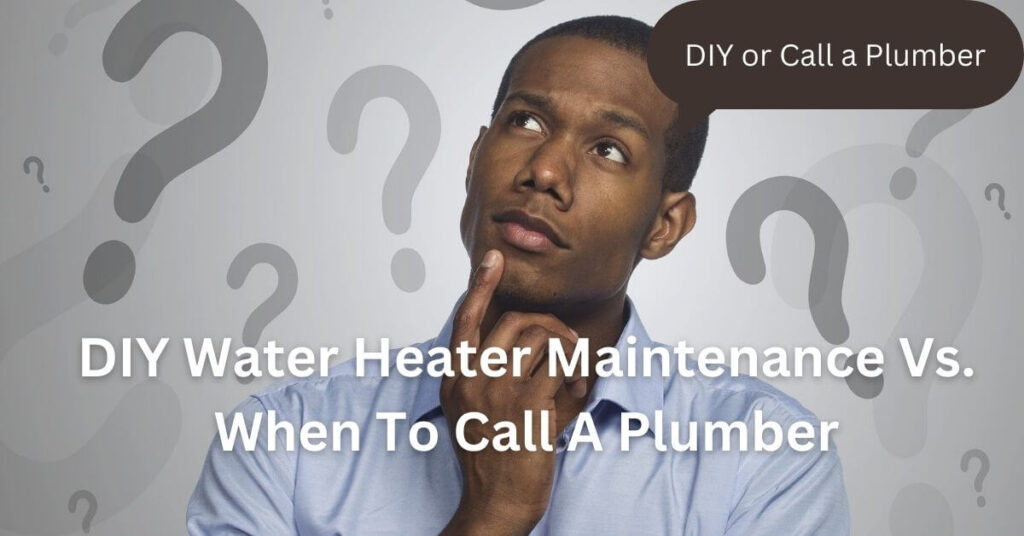DIY water heater maintenance can save money, but professional maintenance is often better for safety and expertise. Deciding between the two depends on your skills, comfort level, and job complexity.
Understanding the pros and cons of each approach will help you make an informed decision for your home.
DIY Water Heater Maintenance
Many homeowners consider doing their own water heater maintenance to save money and learn new skills. DIY tasks often include basic upkeep like flushing the tank, checking the temperature setting, and inspecting parts. Let’s look at the advantages and disadvantages of DIY maintenance.
Pros of DIY Water Heater Maintenance
- Cost savings
DIY maintenance can save you the labor costs that come with hiring a professional. This makes it appealing for homeowners on a budget. - Control over the process
By handling the work yourself, you control the timing and exact steps taken. You won’t need to schedule around someone else. - Gaining knowledge
Learning to maintain your water heater can give you insight into how it works. This might help you spot issues early on.
Cons of DIY Water Heater Maintenance
- Risk of mistakes
Water heaters are complex appliances. Incorrect maintenance can cause damage, void warranties, or even pose safety risks. - Limited expertise
While DIY may work for minor tasks, diagnosing deeper issues or conducting repairs can be beyond your skill level. - Time-consuming
Even basic tasks like flushing the tank or checking the anode rod can take time. You may need to spend time researching how to do the work.
Professional Water Heater Maintenance
Hiring a licensed plumber or technician to maintain your water heater can ensure expert care. Professionals offer thorough maintenance that includes inspection, cleaning, and sometimes minor repairs. Here’s a breakdown of the pros and cons of choosing professional water heater maintenance.
Pros of Professional Water Heater Maintenance
- Expert knowledge
A trained professional has the experience to spot problems that may go unnoticed by the average homeowner. This expertise can prevent bigger issues down the line. - Thorough inspections
Professionals can perform more detailed checks, including evaluating parts that are hard to reach. This ensures the entire system is running smoothly. - Safety
Water heaters involve electricity, gas, and water. Professionals understand how to handle these elements safely. They are also trained to follow local codes and regulations. - Warranty protection
Most manufacturers recommend professional maintenance to keep warranties valid. Hiring a pro can protect your investment in the long term.
Cons of Professional Water Heater Maintenance
- Higher upfront cost
The primary downside of hiring a professional is the cost. Maintenance services come with labor charges that can add up over time. - Scheduling inconvenience
You’ll need to arrange for a technician to come to your home, which can sometimes be inconvenient depending on their availability. - Less hands-on experience
Hiring a pro means you won’t learn how to maintain the system yourself. If you prefer a DIY approach, this can be a drawback.
When to DIY vs. When to Call a Professional
Now that we’ve covered the pros and cons of both DIY and professional water heater maintenance, how do you decide which is best? The decision often depends on the complexity of the task and your comfort level.
Tasks You Can Handle Yourself
If you’re comfortable with basic maintenance, certain tasks are safe to DIY. These include:
- Flushing the tank: This helps remove sediment buildup and can be done with a hose and bucket.
- Checking the temperature: You can adjust the thermostat if needed, keeping it at a safe 120°F to avoid scalding.
- Inspecting the pressure relief valve: This safety device prevents the tank from exploding. Checking it annually is essential.
- Replacing the anode rod: This rod prevents rust. You’ll need basic tools, but the job is straightforward.
When to Call a Professional Plumber
For more complex maintenance or repairs, it’s better to leave the job to a licensed technician. Professional help is essential for:
- Electrical or gas issues: Any problem with wiring or the gas line requires expertise.
- Leaks or flooding: Significant leaks or flooding are signs of larger issues. Only a professional can properly diagnose and repair them.
- Unusual noises: Banging or popping noises could indicate sediment buildup or a failing part.
- Pilot light problems: If the pilot light won’t stay lit, it could signal a more significant issue with the gas valve or thermocouple.
The Cost Factor: DIY vs. Professional
Cost is a key consideration in choosing between DIY and professional water heater maintenance. DIY methods can cost next to nothing in terms of labor but may require purchasing tools. Hiring a professional, however, can range from $100 to $200 or more for annual maintenance.
However, you should also factor in the potential cost of mistakes. Incorrect DIY maintenance could lead to expensive repairs. On the other hand, professional services provide peace of mind, knowing the job is done right.
Final Thoughts
Deciding between DIY and professional water heater maintenance depends on your experience, comfort level, and the complexity of the task. For simple upkeep, DIY can be a good option. However, for safety and long-term efficiency, hiring a professional is often the smarter choice.

